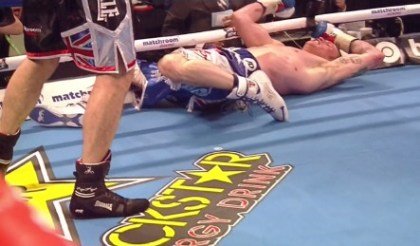Someone once described boxing as show business with blood. Joe Frazier’s take on it was perhaps more to the point. “Boxing is the only sport where you can get your brain shook, your money took, and your name in the undertaker book.”
How to place boxing as a sport in the second decade of the 21st century? Whenever we take a measure of ourselves and society today the word civilized automatically springs to mind – and yet, interrupting this smug belief in our own sophistication, up pops a sport like boxing to remind us of the uncomfortable truth that barbarism still has its place.
When Carl Froch and George Groves made their way to the ring at Wembley Stadium, prior to their much anticipated rematch, accompanied by a wall of noise generated by 80,000 fans, you could just picture the horror on the faces of those for whom progress is synonymous with sterility. The primitive and raw nature of boxing defies centuries of enlightenment and technological advance. It anchors us to our baser instincts, to a time when strength, determination, and a capacity for brutality were key when it came to determining success or failure in life.
The bad blood that existed between both fighters leading up to the fight fed a growing need for the showdown when it finally arrived. They had both put themselves through hell in the build up, fuelled by an unquenchable anger that was tinged, no doubt, with moments of fear and trepidation as the calendar moved inexorably towards this one night, when it would be fists rather than words doing the talking.
Putting everything on the line in front of a seething mass of humanity – some supporting you, others baying for your blood – can be described as many things, but civilized is not one of them. Comparisons with ancient Rome and the Coliseum immediately come to mind, reminding us that bread and circuses is still with us. Perhaps more significantly, in 2014, is the inescapable feeling that being part of such a huge crowd to witness two men engaging in unarmed combat is akin to witnessing evolution in reverse.
While the first fight between Carl Froch and George Groves may have ended in controversy, the second fight ended conclusively when Froch’s right hand made a flush connection with Groves’ chin in the 8th round to knock him out.
Groves had spent the best part of a year – from before their first fight in November 2013 up to the rematch on May 31, 2014 – goading, ridiculing, and taunting the four time world champion. For a champion with a fierce sense of pride, such as Carl Froch, it would have served to undermine and chip away at the foundation of self belief and respect assiduously built upon the dozen years he’d spent fighting as a professional. His rise to the top of the sport had not been smooth or easy. For years he had trained and fought for very little money in modest venues around the country. Even after becoming world champion, which he did for the first time in 2008 when he defeated Canada’s Jean Pascal in 2008 to claim the then vacant WBC super middleweight title, rewards and recognition continued to elude him.
Thus when George Groves – ten years younger – stepped into Froch’s life just as the world champion was entitled to contemplate retiring amid the comforting embrace of respect, admiration, and plaudits for his undoubted achievements and worthy acclaim for taking on the very best time and again, it must have seemed that the gods had turned against him.
Carl Froch is a man who fights ugly in the ring, his style that of the artisan rather than the artist, but outside the ring exemplifies the word ‘noble’ in noble art. He carries himself with bearing and dignity – proud, you can tell, of being world champion in a sport which to him ennobles and elevates the human spirit rather than degrades it.
In the first fight, George Groves had emerged the moral victor if not the actual winner. He had walked to the ring to a chorus of boos and left being cheered to the rafters. The audacity and bravery of his performance in between those two points ensured that the praise he received was deserved. He dazzled on the night, serving up an ‘ass whupping’ for the first six rounds that the world champion must have recalled regularly and with a jarring sense of unease in the six months between that night in Manchester and the rematch in London.
Groves climbed into the ring at Wembley on the back of an an entrance which suggested that the fight was already won. Into the stadium he came on an open-top London bus, preceded by fireworks and the booming Shakespearian exhortation from Henry V, which ends with “Cry God for Harry, England, and St George!”
It was stirring stuff, but you couldn’t help thinking while listening to it that the challenger was overplaying his hand.
And so it proved. One punch, a right hand that had been teed up with a left hook, left George Groves slumped on his stool in the corner being fed oxygen, while in the centre of the ring Carl Froch stood soaking up the appreciation of 80,000 spectators, euphoria emanating from every pore along with the sweat which defines every fighter’s career.
It was a fitting end to an historic night and as exciting a spectacle you could hope to experience. If this is what passes for barbarism today, maybe there’s a case for suggesting we need more of it.
